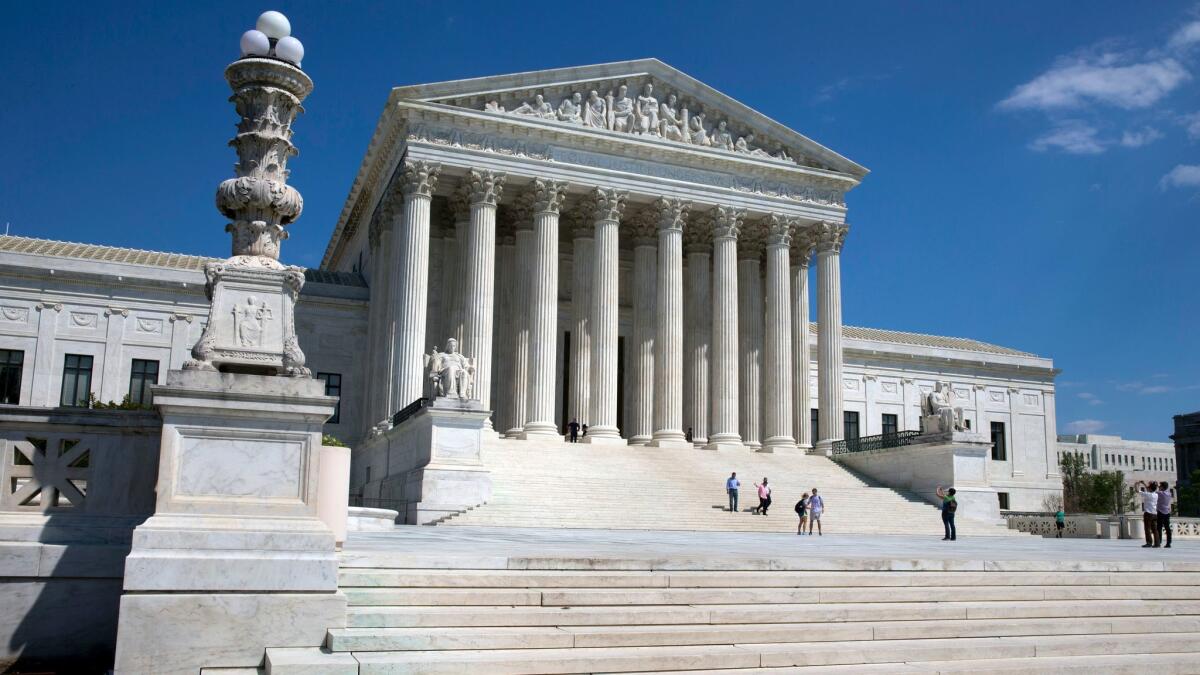Supreme Court makes it easier for companies to defend patent cases

- Share via
The Supreme Court just made it easier for companies to defend themselves against patent infringement lawsuits.
The justices ruled unanimously Monday that such lawsuits can be filed only in states where the target companies are incorporated. The issue is important to many companies that complained about patent owners “shopping” for favorable courts in other parts of the country to file lawsuits.
For the record:
9:39 p.m. June 5, 2025An earlier version of this story gave Scott Keller’s title as Texas’ attorney general. He is the state’s solicitor general.
The case involved an appeal from TC Heartland, an Indiana-based food sweetener company sued by Kraft Foods in Delaware. Lower courts refused to transfer the case to Indiana.
But the Supreme Court’s ruling will have the biggest effect on federal courts in eastern Texas, where more than 40% of patent lawsuits are now filed. Local rules there favor quick trials and juries tend to be more sympathetic to plaintiffs.
The ruling is a blow to so-called patent trolls — shell companies that buy up patents and force businesses to pay license fees or face expensive litigation. Many of those cases now may have a tougher time getting to trial or result in jury verdicts that are less generous.
Companies including EBay, Kickstarter and Etsy had urged the high court to restrict where such cases can be filed, saying they have been sued repeatedly in courts hundreds or thousands of miles away from corporate headquarters. Even Texas Solicitor General Scott Keller led a coalition of 17 states calling for an end to “forum shopping” in patent cases.
Groups representing inventors and patent owners said new restrictions would place burdens on patent holders and encourage infringing behavior and piracy.
Writing for the court, Justice Clarence Thomas relied on a 1957 Supreme Court case that said patent cases can be brought only where the defendant company is incorporated. He said the federal appeals court in Washington that handles patent appeals was wrong to say Congress had changed those rules.
The ruling is a “seismic decision” that will affect patent litigation around the country, said John O’Quinn, a lawyer specializing in patent law. He said it may lead to a surge in patent cases in Delaware — favorable state law has led many companies to incorporate there.
That shift will mean a dramatic decline in cases at the federal courthouse in Marshall, Texas, where hundreds of patent lawsuits are filed each year.
Justice Neil Gorsuch did not take part in the case, which was argued before his confirmation.
ALSO
Qualcomm sues iPhone makers, escalating a patent war with Apple
Delicious and litigious: UC’s strawberries are in court — again
UPDATES:
11:20 a.m.: This article was updated with details about the ruling, comment from an attorney and additional background information.
This article was originally published at 8:35 a.m.
More to Read
Inside the business of entertainment
The Wide Shot brings you news, analysis and insights on everything from streaming wars to production — and what it all means for the future.
You may occasionally receive promotional content from the Los Angeles Times.










